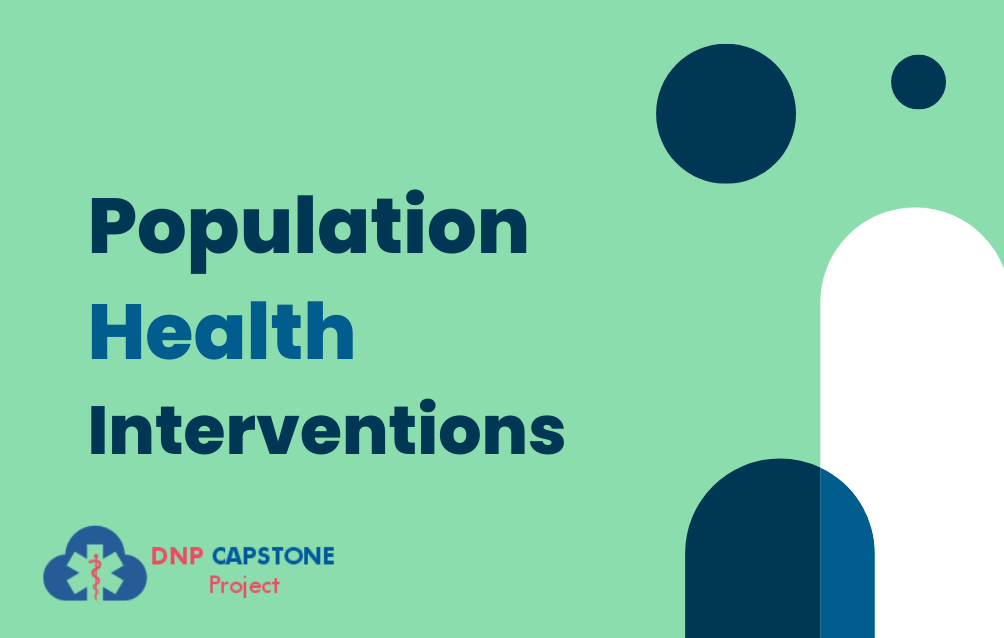Population Health Interventions in DNP Practice
Population health interventions are a vital part of Doctor of Nursing Practice (DNP) programs, equipping advanced practice nurses with the skills to lead healthcare transformation. Unlike traditional patient-centered care, population health focuses on communities, systems, and policies that impact health outcomes on a broader scale.
For DNP-prepared nurses, designing and implementing population health initiatives means addressing disparities, improving access, and creating sustainable, evidence-based solutions that strengthen community well-being.
What Is Population Health in DNP Programs?
Population health emphasizes improving outcomes for groups of people while reducing inequities and addressing the social determinants of health (SDOH). In DNP education, this translates into interventions that go beyond the clinic or hospital setting to include public health, policy, and technology-driven strategies.
DNP-prepared nurses play a central role in:
-
Designing community-based health programs.
-
Leading system-wide quality improvement initiatives.
-
Advocating for policies that promote health equity.
-
Using data and technology to track outcomes.
Common Population Health Interventions in DNP Practice
1. Preventive Health and Wellness Programs
DNP leaders often implement initiatives that reduce the burden of chronic diseases and improve long-term outcomes, such as:
-
Diabetes and hypertension screening programs.
-
Obesity and nutrition education in schools.
-
Immunization drives and vaccine awareness campaigns.
2. Care Coordination and Transitional Care
Population health relies heavily on coordinated care. DNP-prepared nurses design interventions such as:
-
Case management for patients with multiple chronic conditions.
-
Hospital-to-home transitional care programs.
-
Partnerships with community organizations to address housing, food, and transportation barriers.
3. Addressing Health Disparities and SDOH
Reducing health disparities is a priority in DNP practice. Strategies include:
-
Mobile health clinics for rural and underserved communities.
-
Telehealth services for patients with limited access to primary care.
-
Policy advocacy for maternal health, Medicaid expansion, and mental health services.
4. Policy and System-Level Change
DNP graduates are trained to influence healthcare at the systems level, which may include:
-
Developing policies to reduce hospital-acquired infections.
-
Advocating for healthcare legislation that improves access and affordability.
-
Using population health data to guide policy decisions.
5. Technology-Enabled Interventions
Digital innovation is transforming population health. Examples include:
-
Electronic health record (EHR) dashboards to track at-risk groups.
-
Mobile health apps to support medication adherence.
-
Predictive analytics to identify emerging public health concerns.
The Role of the DNP Scholarly Project
A cornerstone of DNP education is the DNP project, often focused on population health. Students identify a healthcare gap, implement an evidence-based solution, and evaluate outcomes.
Examples of DNP population health projects include:
-
Reducing ER visits among older adults with chronic conditions through home-based monitoring.
-
Increasing vaccination rates in a local community via outreach and education.
-
Improving maternal health outcomes by implementing culturally tailored prenatal programs.
Challenges in Implementing Population Health Interventions
While these interventions are impactful, DNP-prepared nurses often face barriers such as:
-
Limited funding and organizational support.
-
Resistance to change within healthcare systems.
-
Data collection and measurement difficulties.
-
Policy restrictions affecting nurse practitioner scope of practice.
Overcoming these challenges requires strong leadership, interprofessional collaboration, and advocacy—all key skills emphasized in DNP programs.
Why Population Health Interventions Matter for DNPs
Healthcare systems are moving toward value-based care models that reward prevention, quality, and equity. DNP-prepared nurses are uniquely positioned to lead this change by bridging the gap between clinical practice, research, and policy.
Through population health interventions, DNPs are able to:
-
Improve health outcomes at the community level.
-
Reduce healthcare costs by focusing on prevention.
-
Advance health equity by addressing disparities.
-
Drive systemic change through leadership and policy.
Population health interventions in DNP practice prepare nurse leaders to go beyond bedside care. By addressing social determinants, leveraging technology, and influencing policy, DNP-prepared nurses create sustainable solutions that improve health outcomes for entire populations.



